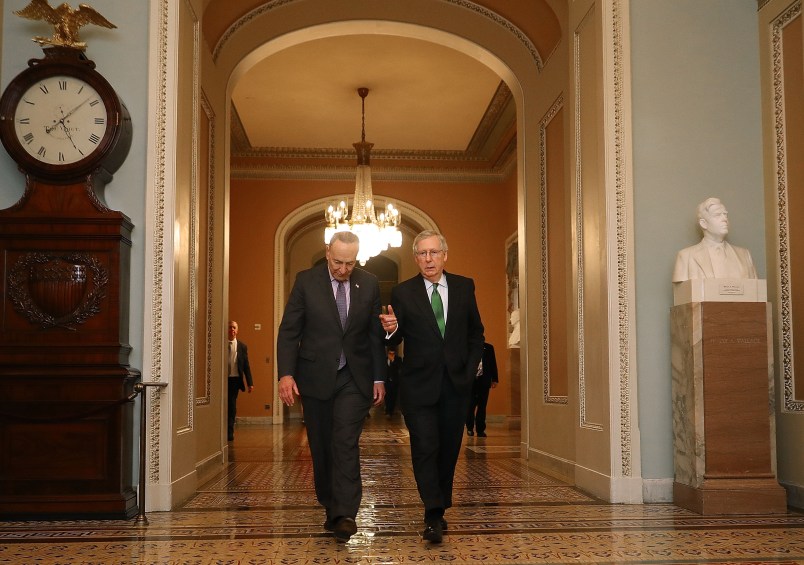This article is part of TPM Cafe, TPM’s home for opinion and news analysis.
As Congress and the Biden Administration engage in increasingly frantic negotiations around a bipartisan infrastructure bill, many of us are left wondering: Is any of this worth it?
Senate Minority Leader Mitch McConnell (R-KY) doesn’t believe so. The Minority Leader told a Kentucky audience earlier this month the “era of bipartisanship” was over as he prepared for “a hell of a fight” over the bipartisan infrastructure bill.
The spending side of the bipartisan framework is insufficient on its own, but Democrats know it could fit as one part of an overall package alongside a budget reconciliation bill. But if Republicans refuse to meet the needs of the American people, do we really need them to be part of passing a critically important bill?
The crises we face are too urgent to hold onto the idea that getting things done in a particular manner is more important than simply getting things done. Bipartisanship does not work in the 21st century, is not valued by voters, and is not necessary for major policy changes. If anything, the misplaced emphasis on “reaching across the aisle” hampers real change.
Republicans are not acting in good faith.
Democrats appealed to bipartisanship over and over last cycle, while Republicans painted Democrats as extremists and radicals. That same bad faith transaction also repeats itself in our legislative process.
At first, the 11 Republicans and 10 Democrats in the Senate who endorsed the initial bipartisan infrastructure proposal signaled their support for the new framework as well. But following statements from President Biden, Speaker Pelosi, and Majority Leader Schumer emphasizing the bill must move alongside a partisan reconciliation bill, some Republicans said they were ready to walk away. They did this week, at least when it came down to invoking cloture on the bill to open it up for debate, feigning outrage over Schumer’s deadline and requesting more time to sort out various payfors that they’ve already been negotiating for weeks. We predicted this from the start.
Republicans are not engaging in a good faith effort to pass impactful legislation. They are aiming to pit the watered-down bipartisan proposal against the reconciliation bill — the one that could actually rebuild this country. This is true whether we are talking about infrastructure or the right to vote. President Biden recently called out the GOP’s role in the constant barrage of restrictive voting rights laws across the country, describing it as the “most significant test of Democracy since the Civil War.” If Republicans were interested in bipartisanship and what is actually best for Americans, passing critical legislation like this wouldn’t be so contentious.
But Remember: Republicans are only relevant to this process to the degree that moderate Democrats allow them to be. Democratic leadership controls what bills come to the floor on Capitol Hill and when they arrive. The real issue is whether Democrats can remain unified. Sens. Joe Manchin (D-WV) and Kyrsten Sinema (D-AZ), in particular, are enabling Republican relevancy, but to what end?
Major policy changes do not require bipartisanship.
While there is a myth that major policy proposals require broad bipartisan consensus, when we look at history it’s clear that is not entirely true.
The original passage of Social Security and Medicare in 1965 included many more Republican votes than we typically see today, and in 2003, Democrats supported implementing George W. Bush’s Medicare Part D prescription drug benefit. But the lead-up to the passage of these programs was marked by bitter partisan warfare and rhetoric, and ultimately it was much more a party-line vote than not.
To save our country bipartisanship must die.
The question Democrats should be asking ourselves right now is whether we are addressing the defining problems on which Biden hinged his campaign: COVID-19 response, climate, economic inequality, and racial justice. Somehow the process by which things get done in Congress has become more important than actually getting things done. We cannot continue to fail to deliver change for the American people, as we continue to deal with the fallout of a devastating global pandemic, no less.
If Democrats aren’t confident in the veracity of their ideas — and the support of the 90 million Americans who voted for Democrats in the last three cycles, 10 million more than GOP voters — then they don’t deserve to govern in their name.
Democrats have a responsibility to drive forward the mandate of the American people. They should embrace it without fear. Because if Democrats enact real change and succeed in telling that story clearly, the votes will follow in 2022 and beyond.
Jenifer Fernandez Ancona is Vice President of Political & Narrative Strategy at Way to Win.







So how do we convince Manchin, Sinema, and others who want to keep the filibuster that McConnell isn’t going to let any GQPer play “Bipartisan Bingo” in the Senate?
The Reconciliation Package will save this country
They both already know it. McConnell is buying them off, sadly. Manchin continually votes against the needs of his constituents, and I’m beginning to think that Sinema is a GOP plant.
Proof???
The filibuster must be set up so that it is not McConnell saying “do it”.
It must take the sort of effort that it required years ago.
The dearth of discussion on this is malpractice.